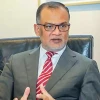Bangladesh will require $116.8 billion to implement its Third Nationally Determined Contribution (NDC 3.0) plan, which targets cutting 84.92 million tonnes of CO₂ equivalent emissions by 2035.
Of the required funds, $25.95 billion is estimated for unconditional investment, while $90.23 billion will be needed under conditional investment scenarios, Environment Adviser Syeda Rizwana Hasan said on Sunday.
The adviser made the remarks while addressing as chief guest the “Validation Workshop on the Third Nationally Determined Contribution (NDC 3.0)” held at the Department of Environment in Agargaon.
According to the plan, 26.7 million tonnes (6.39%) of emissions will be reduced unconditionally, while 58.2 million tonnes (13.91%) will be reduced conditionally by 2035.
NDC 3.0 is not only a plan for emission reduction but also a pledge to build an inclusive and just future,” Rizwana said, stressing the need to prioritize women, children, the elderly, persons with disabilities, ethnic minorities, and climate migrants in the process. She called for rights-based climate action so that “no one is left behind.
She highlighted the transformative role of youth through renewable energy projects, green entrepreneurship, research, and awareness programmes, saying their engagement is crucial to build a climate-resilient Bangladesh for future generations.
The adviser also emphasized the importance of ensuring resilience across health, water and sanitation, education, food security, agriculture, and infrastructure sectors.
Climate education and green skills must be integrated into the national curriculum to prepare the young generation, she added.
On the renewable energy transition, she underlined the importance of a “Just Transition,” which requires retraining workers, supporting small entrepreneurs, and ensuring the participation of vulnerable communities.
Without the collective efforts of the government, development partners, the private sector, researchers, and civil society, it will not be possible to build a sustainable, inclusive, and climate-resilient Bangladesh,” she said.
The workshop was also addressed by Environment Secretary Dr Farhina Ahmed and Additional Secretary (Climate Change) Mohammad Navid Shafiullah. The session was chaired by Department of Environment Director General Dr Md Kamruzzaman and conducted by Joint Secretary (Climate Change) Dharitri Kumar Sarkar.
Representatives from various national and international government and non-government organisations also joined the open discussion session.

-1758451551.webp)
 Prev Post :
Prev Post :
